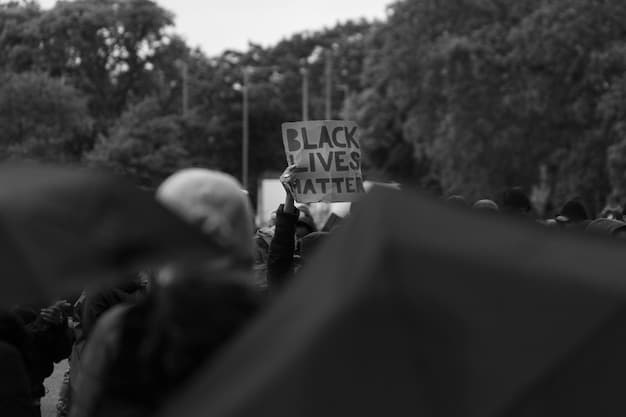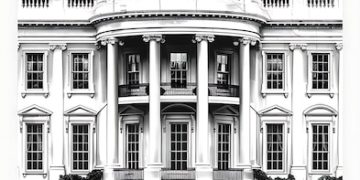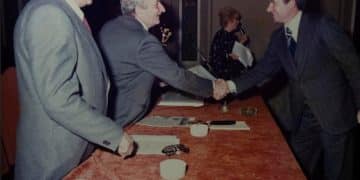Vietnam War’s Enduring Impact on US Opinion & Policy in 2025

The Vietnam War’s profound impact continues to shape US public opinion and foreign policy in 2025, influencing perspectives on military intervention, international relations, and domestic priorities through its historical lessons and societal consequences.
The specter of the Vietnam War looms large over the United States, casting a long shadow that extends into 2025. Understanding How Did the Vietnam War Shape US Public Opinion and Foreign Policy in 2025? requires examining its multi-faceted legacy on American society, political thought, and international engagement.
The Genesis of Distrust: Vietnam and American Credibility
The Vietnam War era was a watershed moment for the United States. It not only reshaped the nation’s geopolitical strategy but also deeply influenced the American people’s confidence in their government and military.
Erosion of Public Trust
Prior to Vietnam, Americans generally held a favorable view of their government. However, the conflict’s progression, coupled with revelations of government deception, ignited a fierce distrust that persists to this day.
Media’s Role in Shaping Perceptions
The war was one of the first to be extensively televised, bringing the harsh realities of combat directly into American living rooms. This unprecedented access challenged the government’s narrative and fueled skepticism.
- The Tet Offensive of 1968 dramatically shifted public opinion against the war, despite being a military victory for the US.
- The Pentagon Papers, leaked in 1971, exposed a history of government misinformation regarding the war’s objectives and progress.
- Photographs and reports of civilian casualties and atrocities, such as the My Lai Massacre, further eroded public trust.
In conclusion, the Vietnam War era eroded the image of trust and faith the American citizens used to have in the government, as the harsh reality of the war was shown to the public, media had a strong impact on the people.
The Vietnam Syndrome: Reluctance Towards Interventionism
One of the most immediate and lasting effects of the conflict was the emergence of what became known as the Vietnam Syndrome. This refers to a general public aversion toward foreign military interventions, particularly in conflicts perceived as ambiguous or lacking clear objectives.
Political Ramifications
Politicians became wary of engaging in military actions abroad without strong public support and clearly defined goals. This hesitation has colored US foreign policy decisions for decades.
A Shift in Foreign Policy Doctrine
The experience in Vietnam led to a reevaluation of America’s role as the world’s policeman. Policymakers began to prioritize diplomatic solutions and multilateral engagement over unilateral military action.

The Vietnam Syndrome significantly tempered the United States’ appetite for interventionism, leading to a more cautious and selective approach to foreign policy. This syndrome impacted politicians’ decisions and made them rethink if the US should act as a world policeman.
Economic Burdens and Shifting Domestic Priorities
Beyond its impact on foreign policy, the Vietnam War had significant economic consequences that continue to influence domestic policy debates. The massive expenditure on the conflict diverted resources from vital social programs and contributed to economic instability.
Opportunity Costs
The billions of dollars spent on the war could have been invested in education, healthcare, and infrastructure development. This realization fueled calls for a greater focus on domestic needs.
Inflation and Economic Strain
The war contributed to inflationary pressures and weakened the US dollar. This economic strain exacerbated social tensions and fueled demands for greater economic equality.
- President Lyndon B. Johnson’s commitment to both the war and his Great Society programs created a fiscal crisis.
- Rising inflation eroded the purchasing power of American families and exacerbated economic inequality.
- The war’s economic costs led to increased scrutiny of government spending and a greater emphasis on fiscal responsibility.
The economic implications of the Vietnam War prompted a reassessment of domestic priorities, shifting focus toward social reforms, while taking away from other public services.
Evolving Public Discourse on War and Military Service
The Vietnam War also fundamentally altered the way Americans think about war, peace, and military service. The conflict fostered a more critical and nuanced understanding of the complexities of warfare and the sacrifices made by service members.
Increased Awareness of PTSD and Veteran Affairs
The experiences of returning Vietnam veterans brought increased attention to the psychological toll of war, leading to greater awareness of post-traumatic stress disorder (PTSD) and the need for improved mental health services.
Challenges to Traditional Notions of Patriotism
The war sparked debates about the meaning of patriotism and the ethical responsibilities of citizens in a democracy. Anti-war activism challenged traditional notions of unquestioning loyalty to the government.

The Vietnam War’s impact on public discourse has led to a more critical and nuanced examination of war, military service, and the responsibilities of citizenship, ensuring that future conflicts are approached.
Contemporary Echoes: Vietnam’s Lessons in the 21st Century
In 2025, the lessons of the Vietnam War continue to resonate in debates about US foreign policy and military interventions. Policymakers, scholars, and the public draw parallels between the Vietnam experience and contemporary conflicts, seeking to avoid repeating past mistakes.
The Iraq and Afghanistan Wars
The challenges encountered in Iraq and Afghanistan led to renewed scrutiny of interventionist policies, with many observers invoking the specter of Vietnam. The long and inconclusive nature of these conflicts reinforced skepticism about the effectiveness of military solutions.
Public Opinion and Political Discourse
Public discourse on foreign policy remains deeply influenced by the legacy of Vietnam. Concerns about mission creep, civilian casualties, and the financial costs of war continue to shape debates about US involvement in global affairs.
- The Iraq War prompted comparisons to Vietnam, with critics warning against repeating the mistakes of the past.
- The rise of isolationist sentiments in some quarters reflects a desire to avoid foreign entanglements.
- Veterans of Iraq and Afghanistan have played a prominent role in shaping public discourse about the costs and consequences of war.
The echoes of Vietnam resonate strongly with modern US policy decisions, reminding citizens and decision-makers of what happened, and the potential consequences of foreign intervention.
A Divided Nation: Healing From the Wounds of War
The Vietnam War has left lasting social and political wounds. Healing these divisions remains a critical task for American society, as the nation continues to grapple with the legacy of the conflict.
Reconciliation and Remembrance
Efforts to promote reconciliation between veterans and anti-war activists have helped to bridge some of the divisions created by the war. Memorials and commemorations serve as reminders of the sacrifices made by all those who served.
Addressing the Needs of Veterans
Ensuring that veterans receive the healthcare, mental health services, and economic support they need remains a priority. The experiences of Vietnam veterans have shaped policies aimed at improving the well-being of those who serve in the military.
The legacy of Vietnam continues to challenge and shape the choices and consciousness of the American people, informing them of decisions of US foreign policy.
| Key Point | Brief Description |
|---|---|
| ⚠️ Distrust in Government | Vietnam eroded public faith due to misinformation and televised war realities. |
| 🕊️ Intervention Reluctance | The “Vietnam Syndrome” made the US cautious about foreign military interventions. |
| 💰 Economic Priorities Shift | War costs redirected funds from social programs, prompting a focus on domestic needs. |
| 🧠 Evolving War Discourse | Vietnam sparked debates on war ethics, PTSD awareness, and veteran support. |
Frequently Asked Questions
▼
The Vietnam War led to a more cautious approach to foreign intervention, with policymakers prioritizing diplomatic solutions and multilateral engagement over unilateral military action to achieve foreign policy goals.
▼
The “Vietnam Syndrome” refers to public aversion toward foreign military interventions. This reluctance continues to shape political discourse, making politicians wary of engaging in military actions without strong public support.
▼
The Vietnam War caused economic instability by diverting resources from social programs, contributing to inflation, and weakening the US dollar. This economic strain exacerbated social tensions and demands for greater equality.
▼
The US learned the importance of public support, clear objectives, and the limitations of military power. The war also highlighted the psychological toll of combat, leading to increased attention to veteran affairs.
▼
In 2025, the Vietnam War continues to shape domestic priorities by prompting a focus on social reforms, healthcare for veterans, and economic equality. It reinforces the need for responsible government spending and addressing social divisions.
Conclusion
In conclusion, the Vietnam War’s profound influence continues to shape US public opinion and foreign policy in 2025, impacting perspectives on military intervention, international relations, and domestic priorities while underscoring the need for introspection and adaptation.





